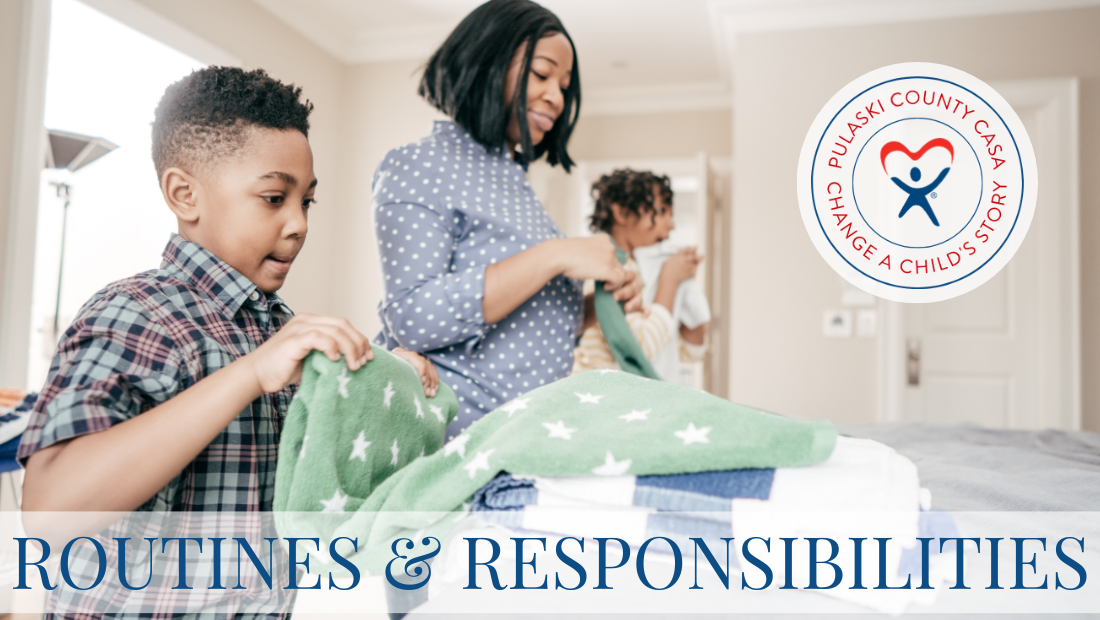
23 Aug R&R – Routines & Responsibilities
As our kids return to school after the summer break the question comes to mind – Why is it important for children to have responsibilities and routines?
Routines help children feel safe, develop life skills, and build healthy habits. Routines help parents feel organized, reduce stress, and find time for enjoyable activities. Good routines are well-planned, regular, and predictable. Routines give children a sense of security and control over their environment. When life is organized and consistent at home, children feel safe, secure, and looked after, especially during stressful times or during difficult stages of development.
- Establish routines for your child. Children thrive on orderliness. Keep a fairly regular schedule for meals, play, and work time. Set a regular bedtime. When a child is used to a routine at home, he/she can adapt to classroom rules more easily.
- Spend time every day talking with your child about his/her interests, hobbies, and friends. Children learn language at home and spoken language gives children the foundation for better reading and writing. As children grow older, they need daily conversations as a way to develop values, test ideas, and share their thoughts.
Routines can bring you and your child/children closer together and reduce power struggles. If your family doesn’t have any routines in place, don’t worry, it’s never too late to start.
Routines can help kids to build crucial executive functioning skills-
- Kids are a bundle of energy.
- They learn things at breakneck speed and display creativity in ways that many adults wish they could, sometimes.
- But one thing they need help with is structure and organization.
That’s where a daily routine comes into play.
- A daily routine puts bedtime battles to rest – Kids are little energizer bunnies and may do all they can to avoid hitting the sack. Sometimes they don’t want to sleep when they’re told to because they don’t have an established bedtime routine. Remember, the brain and the body’s circadian rhythm is highly responsible to repetition, highly sensitive to disorder. In other words, when kids abide by a schedule and go to bed at a specific time, their brain and body will get the cue to “power down” at that time. This takes experimentation and patience, but it will do wonders for your kids’ sleep habits.
- Daily Routines Reduce Parental Exhaustion- Have you ever thought or said, “Ugh. I’m wiped.” after coming home from a long day of work? The feeling is amplified when you walk into a room full of toys, or bouncing kids who haven’t done their homework, unpacked their lunchbox or cleaned their rooms as you told them to. Establishing a daily routine allows you to set these kinds of expectations. The repetition really does help. When kids have a daily routine, they know mom and dad have assigned a task that needs to be done on time. When it’d not done, there is a response from mom or dad which shows the expectation wasn’t met. When it is done and done well, we can show a job well done. This positive response is powerful and when paired with repetition, can help build the daily routine and structure kids, and parents crave! It is not easy getting your kids to adhere to a daily routine. It takes time and effort. However, routines are so impactful for children and can provide them with a level of organization, care, and responsibility; skills they will keep into adulthood!
It’s important that children have opportunities to show that they are responsible for their actions, their schoolwork, and their relationships in life. To be responsible means you are trusted, you can make decisions, and you can face the consequences for your behavior. Chores are a great way to teach children responsibility. However, it’s important that chores are not a form of punishment; rather they’re a way to help the family. Try to give your child/children many opportunities to be responsible and model responsible behavior for them. Encourage them and be positive about chores but don’t do the work for them. Through household tasks children start to see themselves as vital contributors to the family, making them feel more responsible, and also making them more responsible.
Give your child responsibilities at home. These might include:
- Keeping the bedroom tidy
- Sharing responsibility for a pet
- Doing one thing daily for the good of the whole family- washing dishes, picking up in the living room, or washing the car
Not only will you appreciate the difference routines and responsibilities make but so will your children.
Stanley Barnes is an Advocate Supervisor with Pulaski County CASA. He is also a Minister and Founder and CEO of Building Bridges/Mending Fences Mentoring. He has a lifetime of experience in leadership and youth and adult mentoring.

puravive reviews
Posted at 03:55h, 27 FebruaryThis entrance is phenomenal. The wonderful information shows the moderator’s earnestness. I’m awestruck and expect more such astounding posts.
EsbeOvego
Posted at 06:30h, 17 MarchThanks for the post